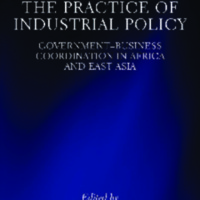The Practice of Industrial Policy
Dublin Core
Subject
Description
Much of the information relevant to policy formulation for industrial development is held by the private sector, not by public officials. There is, therefore, fairly broad agreement in the development literature that some form of structured engagement—often referred to as close or strategic coordination—between the public and private sectors is needed, to assist in the design of appropriate policies and provide feedback on their implementation. There is less agreement on how that engagement should be structured, how its objectives be defined, and how success be measured. In fact, the academic literature provides little practical guidance on how governments interested in developing such a framework should go about doing it. The burden of this lack of guidance falls most heavily on Africa, where—despite twenty years of growth—lack of structural transformation has slowed job creation and the pace of poverty reduction. In 2014, the Korea International Cooperation Agency (KOICA) and United Nations University World Institute for Development Economics Research (UNU-WIDER) launched a joint research project: The Practice of Industrial Policy. The aim is to help African policy makers develop better coordination between public and private sectors in order to identify the constraints to faster structural transformation and design, implement, and monitor policies to remove them. This book, written by national researchers and international experts, presents the results of that research by combining a set of analytical ‘framing’ essays on close coordination with case studies of successful and unsuccessful efforts at close coordination in Africa and in comparator countries.
Source
http://oapen.org/download?type=document&docid=628111
Publisher
Contributor
Rika Zulfia
Rights
Creative Commons
Type
Files
Collection
Citation
John Page and Finn Tarp, , “The Practice of Industrial Policy,” Open Educational Resources (OER) , accessed March 4, 2026, https://oer.uinsyahada.ac.id/items/show/989.


